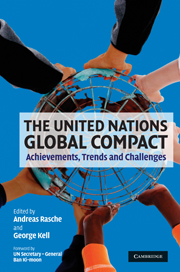Book contents
- Frontmatter
- Contents
- List of figures
- List of tables
- List of boxes
- List of abbreviations
- List of contributors
- Acknowledgements
- Foreword
- Why This Book Matters!
- The Ten Principles of the United Nations Global Compact
- 1 Introduction: the United Nations Global Compact – retrospect and prospect
- Part I Achievements, trends and challenges: reflections on the Principles
- Part II Participants and engagement mechanisms
- 7 Implementing the United Nations Global Compact
- 8 Academic institutions and the United Nations Global Compact: the Principles for Responsible Management Education
- 9 Corporate responsibility and the business school agenda
- 10 NGOs and the United Nations Global Compact: the link between civil society and corporations
- 11 Financial markets and the United Nations Global Compact: the Principles for Responsible Investment
- 12 Learning from the Roundtables on the Sustainable Enterprise Economy: the United Nations Global Compact and the next ten years
- 13 The United Nations Global Compact as a learning approach
- Part III Governance and Communication on Progress
- Part IV Local Networks: the emerging global–local link
- Glossary
- Bibliography
- Index
13 - The United Nations Global Compact as a learning approach
Published online by Cambridge University Press: 05 February 2012
- Frontmatter
- Contents
- List of figures
- List of tables
- List of boxes
- List of abbreviations
- List of contributors
- Acknowledgements
- Foreword
- Why This Book Matters!
- The Ten Principles of the United Nations Global Compact
- 1 Introduction: the United Nations Global Compact – retrospect and prospect
- Part I Achievements, trends and challenges: reflections on the Principles
- Part II Participants and engagement mechanisms
- 7 Implementing the United Nations Global Compact
- 8 Academic institutions and the United Nations Global Compact: the Principles for Responsible Management Education
- 9 Corporate responsibility and the business school agenda
- 10 NGOs and the United Nations Global Compact: the link between civil society and corporations
- 11 Financial markets and the United Nations Global Compact: the Principles for Responsible Investment
- 12 Learning from the Roundtables on the Sustainable Enterprise Economy: the United Nations Global Compact and the next ten years
- 13 The United Nations Global Compact as a learning approach
- Part III Governance and Communication on Progress
- Part IV Local Networks: the emerging global–local link
- Glossary
- Bibliography
- Index
Summary
Globalization as the new context of global business firms
Globalization can be defined as a process of intensification of social and economic relations across national borders (Beck 2000, Giddens 1990). The causes of this process are manifold and have been discussed intensively in the literature (for an overview, see Held et al. 1999, Scherer and Palazzo 2008): political decisions on reducing barriers to trade and opening borders for the transfer of goods, capital and people; technological developments that lead to a decline in the costs of cross-national transportation (e.g. air cargo, container shipping) and coordination (e.g. telephone, Internet); social developments (migration, individualization, erosion of traditions); and emerging transnational risks (global environmental problems, global diseases, global security and terrorism, etc.).
Today, global business firms can take advantage of blurring borders and expand their possibilities of choice for economic exchange processes by shifting their value chain activities to locations that offer lower costs or higher returns. At the same time nation-state institutions are often inadequate for the regulation of transnational businesses, providing global public goods or reducing or compensating negative externalities (Beck 2000, Kaul et al. 1999, Kaul, Grunberg and Stern 2003). In addition, a growing part of world production is being shifted to locations where there is no rule of law, where human rights are not protected, where social and environmental standards are not enforced, or where governments and public authorities are corrupt (Palan 2003).
- Type
- Chapter
- Information
- The United Nations Global CompactAchievements, Trends and Challenges, pp. 234 - 248Publisher: Cambridge University PressPrint publication year: 2010
- 15
- Cited by



